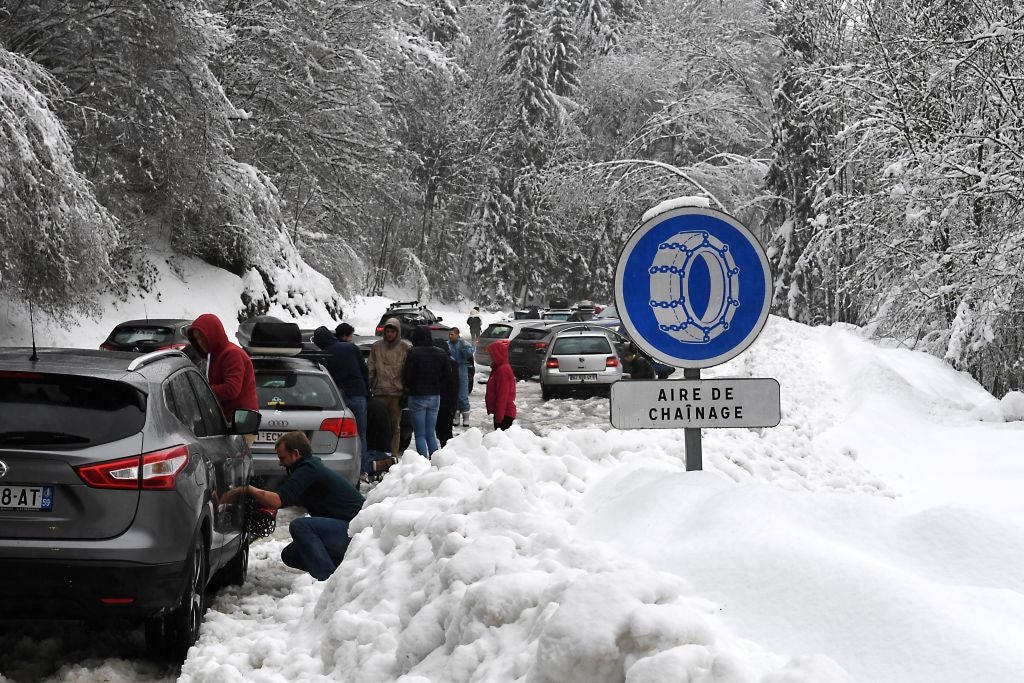Ski holidays: What are passengers’ rights when things go wrong?
After holidaymakers had their journeys to and from the Alps ruined by poor weather over the weekend, Simon Calder explains what passengers’ rights are

Your support helps us to tell the story
From reproductive rights to climate change to Big Tech, The Independent is on the ground when the story is developing. Whether it's investigating the financials of Elon Musk's pro-Trump PAC or producing our latest documentary, 'The A Word', which shines a light on the American women fighting for reproductive rights, we know how important it is to parse out the facts from the messaging.
At such a critical moment in US history, we need reporters on the ground. Your donation allows us to keep sending journalists to speak to both sides of the story.
The Independent is trusted by Americans across the entire political spectrum. And unlike many other quality news outlets, we choose not to lock Americans out of our reporting and analysis with paywalls. We believe quality journalism should be available to everyone, paid for by those who can afford it.
Your support makes all the difference.Hundreds of Christmas skiers who found their 90-minute flight transformed into an all-night coach journey because of atrocious weather in the French Alps have limited legal options for pursuing compensation.
The Package Travel Regulations provides excellent consumer protection for holidays. They stipulate that the tour operator must deliver the trip as planned, or make reparations.
In the case of skiers who were caught up in the monumental traffic jams crawling down from high-altitude resorts, the end of the trip was certainly not as planned. But a tour operator can argue that it had delivered the important components required to satisfy the contract, ie getting everyone to the slopes and enabling them to have a (hopefully) happy and safe holiday.
Closer scrutiny of the rules reveals that when things go wrong: “The organiser will make suitable alternative arrangements, at no extra cost to the consumer, for the continuation of the package and will, where appropriate, compensate the consumer for the difference between the services to be supplied under the contract and those supplied.”
Alternative arrangements were made, and there was certainly a difference with what was originally planned: almost any traveller would say that a swift, comfortable flight is more valuable than a long, overnight coach journey. But putting a price on it is trickier.
ABTA, the travel association, does not help the holidaymaker’s cause. “Compensation is never due when the change or cancellation arose as a result of circumstances amounting to force majeure,” says the guidelines to its Code of Conduct.
If a lawyer put his or her mind to it on the long journey from the Alps to Gatwick via Calais and Dover, they might construct a case as follows: that a tour operator aware of the risk of bad weather and extreme traffic delays could have made alternative arrangements to use the rail link from Bourg-Saint-Maurice. But it was a fast-changing situation, and there will have been very few seats available on trains; the French like Christmas skiing too. So that may not be a reasonable option.
Some travel-insurance policies pay out for delayed arrival home, which may earn a few travellers the odd £50.
Otherwise, the best outcome I can see is that the airline that cancelled the flight refunds the holiday firm for more than it cost to lay on the coach. The tour operator could then divide the saving between the passengers.
But as with so many cases of disruption, the chances are the weary traveller must just put it down to experience. Booking a midwinter holiday amid the highest mountains in western Europe is never going to be a risk-free exercise.
Join our commenting forum
Join thought-provoking conversations, follow other Independent readers and see their replies
Comments